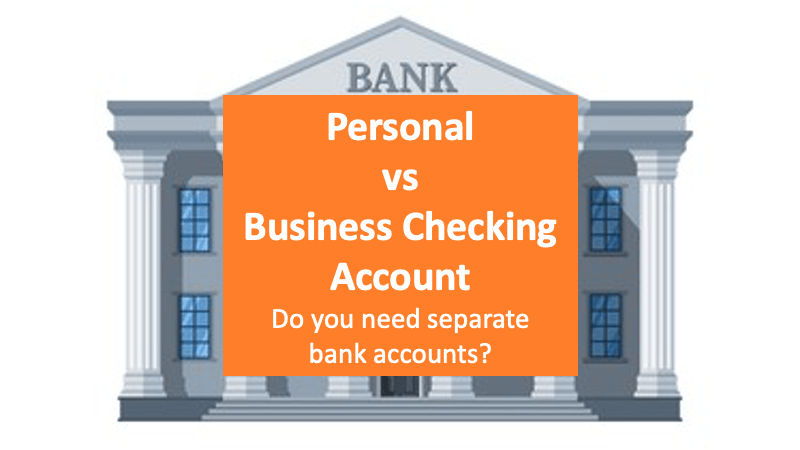Personal vs Business Checking Account, Do You Need Separate Bank Accounts: The Ultimate Guide
Table of Contents
Read if you’re a sole proprietor or small business owner evaluating a personal vs business checking account.

Small business owners, such as sole proprietors, self-employed, and single-member LLCs like yourself, often ponder whether they should open a separate business checking account. Just like you, other small business owners have evaluated having a personal vs business checking account.
Does it make sense to have a separate business checking account dedicated to only your business finances and transactions?
Many small business owners are concerned about the perceived extra costs and hassle of a small business checking account is worth the benefits.
Therefore, many sole proprietors and small business owners run their business finances from their personal checking accounts.
However, there are advantages to having a business checking account. Some advantages of a business checking account are required to run a successful business. This is true for small business owners, even work from home individuals, self-employed, or are a single-member LLC.
Also, there are many new and innovative financial services institutions that cater specifically to the business banking needs of small businesses and sole proprietors. Further, they offer business checking accounts with features specific for small businesses, sole proprietorships, and single-member LLCs at a very low cost.
In this article, we go over the questions you ask as a self-employed individual, a sole proprietor, a single-member LLC, or a small business owner about a personal vs business checking account.
Also, we go into depth about the features available in business checking accounts offered by financial institutions. These banking features address the specific needs of small businesses and sole proprietorships just like yourself.
Should I use the same bank for personal and business?
You shouldn’t use the same checking account for personal and business. This is true if you’re a work-from-home small business owner, sole proprietor, or a large business with many employees.
Instead, you need a separate business bank account. One of the first things you do when opening a business is open a business checking account.
The idea of having two bank accounts, one for personal and one for business, seems inconvenient for most small business owners. This is the main reason most sole proprietors and small business owners don’t have a separate business bank account. In addition, many small business owners and sole proprietors think small business checking accounts have high costs and fees.
The negative perceptions about business bank accounts needs reclairification. Today there are financial institutions that specifically cater to the needs of small business owners and sole proprietors like yourself. These banks offer business checking accounts at basically no cost to low cost. In addition, some even earn checking and savings account interest.
Some of the common areas where small business owners feel a business checking account might charge unnecessary fees are:
- A monthly fee
- A minimum deposit
- Transaction fees
- Withdrawal limits
- No interest
A small business checking account is a must, even for a small business owner that works from home, and not as inconvenient as you first perceived. In addition, with the new small business checking accounts offered on the market there are many options that are no-fee and cater specifically to your business’s needs.
What is a small business checking account?
A business checking account is a type of bank account that allows you to easily deposit and withdraw money. Business checking accounts are for daily business transactions. A business checking account allows you to separate your personal finances from your business finances, prepare taxes, build business credit, and more. A business checking account is a must for most small businesses.
Do I need a business checking account for my small business?
Most small businesses, including if you’re a small business owner that works from home, a sole proprietorship, a single-member LLC up to a large business with hundreds of employees, need a small business checking account. Keep reading for the advantages of a small business checking account so that you understand you need to have one.
Related: Requirements for Opening a Small Business Bank Account
What’s the difference between personal vs business bank accounts?
Business bank accounts are for businesses to use for strictly business purposes. They are not for personal use. A small business uses a business bank account for day-to-day transactions and money management. You need a business bank account whether you work from home as a self-employed sole proprietor. In addition, you need a small business checking account if you have a single-member LLC or a big company.
Related: Sole Proprietorship vs Single-Member LLC: The Complete Comparison
Like personal bank accounts, a business bank account usually includes a business checking account and a business savings account. Also, with a business checking account, you can write and deposit checks, use a business debit card, and transfer money.
Business checking accounts are known for charging numerous fees for services such as:
- Transaction fees
- Maintenance fees
- ATM fees
- Deposit fees
Today, there are many new innovative financial institutions that don’t charge any fees for business checking accounts. However, no-fee business checking accounts might come with tighter restrictions. Therefore, make sure to evaluate each checking account so that you find the business checking account that is right for your business. In addition , if you end up choosing a bank with with fees, you can deduct bank fees from your business taxes.
A business savings account is often used to separate savings from working capital. Also, money set aside in a business savings account earns interest with most banks. However, some savings accounts require a minimum deposit. In addition, some business savings accounts have monthly fees and balance requirements. Make sure your business savings account is FDIC insured.
Can I use the same bank for personal and business banking?
Yes.
You can use the same banking institution for your business banking and your personal banking. However, this is only possible if your bank offers business banking services. In addition, you might be able to get a better deal for your business bank account. This is because you already have a relationship with the bank where you do your personal banking. Of course, this is assuming your account is in good standing.
However, we recommend that regardless you do your research. Research other banking institutions that are different from the one where you do your personal banking. There are many banking institutions that offer bank accounts specific for small business needs that might be better than the business checking account your current bank offers.
Why You Need a Small Business Checking Account: Advantages of a Small Business Checking Account
Most businesses need a business bank account. This is true even if you’re self-employed and you work from home, or you’re a sole proprietor.
Read this section to learn each of the reasons why you need a business checking account. Most reasons you need a business checking account are also the advantages provided to your business through having a business checking account.
Related: How to Open a Small Business Bank Account: A Complete Breakdown into Simple Steps
Tax Advantage
A separate business checking account differentiates your personal from your business expenses and banking transactions. Therefore, it’s easier when it comes time to do your business taxes. During tax time your business income and expenses don’t need to be sorted and separated from your personal purchases and expenses. Your personal and business transactions need to be separated if your personal and business banking are combined in your personal checking account.
In addition, when it’s tax time it will be much easier to do your business taxes. Keeping your business income and expenses separate from your personal income and expenses makes it easier to prepare and file your taxes. Tax preparation is less error-prone, more accurate, and streamlined. This saves you time, and time is money.
Legal Protection
One of the biggest advantages of forming a single-member LLC, a multi-member LLC, a C Corp, or any legal business entity is the benefit of legal liability protection.
Legal liability protection means your business acts as a separate legal entity. As a separate legal entity, your business can enter into contracts, be sued, sue, and be represented in court. Therefore, it’s not you that’s personally sued for something your company does, it’s your company that’s sued. However, this is only true unless you personally guarantee something for your company.
However, this liability protection isn’t always guaranteed. Your level of personal liability protection depends on how you manage your business finances. The legal liability protections of having a separate legal business entity no longer apply if you mix your business and personal finances in the same bank accounts.
When you mix personal and business finances it looks less like you’re running a separate business entity and more like you and your business are one and the same. Therefore, it is imperative that you open a business checking account.
Business Credibility
Having a business bank account gives your business credibility. Instead of your clients and customers writing checks to you directly in your name, they write the checks in your business’s name. This is much more professional.
Other advantages of a business checking account are:
Streamlined Account
Business Credit Card
Merchant Accounts
Merchant accounts allow your bank to accept payment by credit card. Everything you need to know about merchant accounts can be found here: A Comprehensive Guide of Merchant Accounts for Small Businesses, Entrepreneurs, and Sole Proprietors.
Check out this article for all of the benefits of a business checking account (there are more than the few we have gone over here), Benefits of a Business Checking Account: The Complete Guide.
Conclusion
In this article, we compared a personal vs business checking account.
From our comparison, we conclude that a business bank account is a must for any small business owner, even if you are a work-from-home small business owner. A business that wants to be taken seriously needs a business checking account.
We are a community of small business owners, sole proprietors, and self-employed. We would love to hear your story about how you evaluated a personal vs small business checking account. Please leave your experience in the comments below or email us at support@falconexpenses.com.
Was this article helpful?

I used to travel a lot for work. Doing my expenses frustrated me. I would delay submitting them and when I did, I would spend hours taping receipts to paper to scan for my boss. I knew there was a better solution, and I had a background in productivity software, so I created Falcon Expenses. I enjoy creating software that makes people’s lives easier.
In addition, I’m an avid skier and I enjoy hiking, sailing, and cooking.




